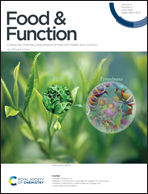Fucoidan isolated from Ascophyllum nodosum alleviates gut microbiota dysbiosis and colonic inflammation in antibiotic-treated mice†
Abstract
Antibiotic treatment, as an important therapeutic intervention, can cause damage to the host microbiome and the intestinal mucosal barrier. In order to find a way to alleviate the side effects of antibiotics, the present study investigated the effects of fucoidan (ANP) isolated from Ascophyllum nodosum on gut microbiota dysbiosis and colonic inflammation induced by ciprofloxacin-metronidazole (CiMe) in C57BL/6J mice. Our results showed that dietary ANP prevented colon shortening, alleviated the colonic tissue damages, and partially reversed the alteration of gut microbiota by increasing the abundance of potentially beneficial bacteria, e.g., Ruminococcaceae_UCG_014 and Akkermansia and decreasing the abundance of harmful bacteria, e.g., Proteus and Enterococcus. ANP also suppressed the overproduction of TNF-α, IL-1β, and IL-6 and promoted the expression of IL-10. In addition, ANP reversed the decreased production of short-chain fatty acids in CiMe-treated mice. Furthermore, correlation analysis indicated the presence of critical gut microbiota, which played important roles in reducing the inflammation-related indices. Thus, the present study suggests that fucoidan isolated from Ascophyllum nodosum is effective in providing protection against the negative effects of antibiotics on gut microbiota and colonic health.



 Please wait while we load your content...
Please wait while we load your content...